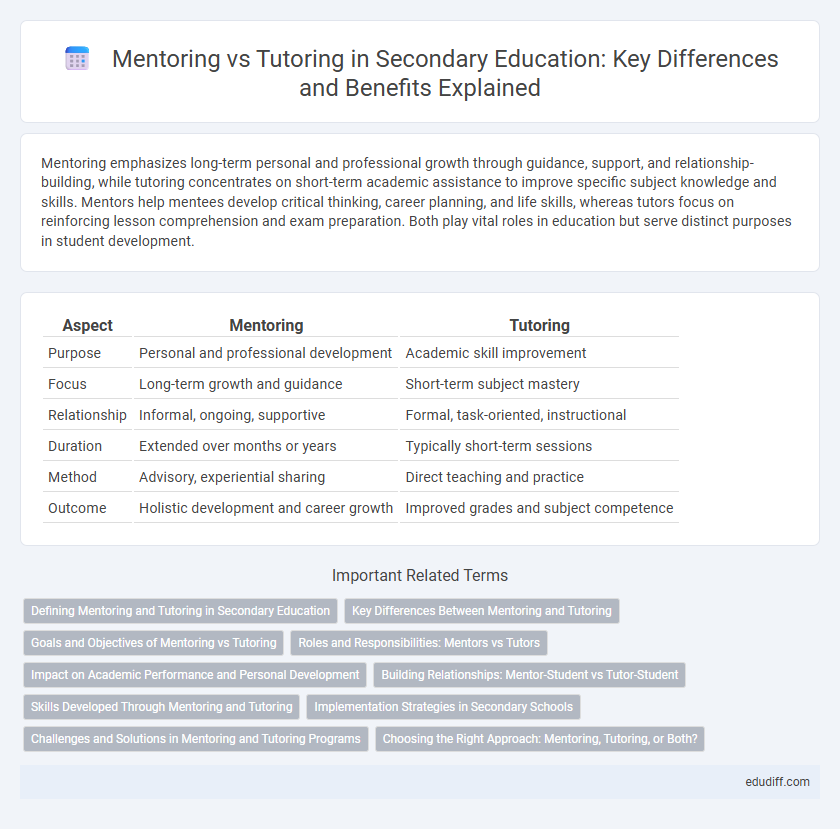Mentoring emphasizes long-term personal and professional growth through guidance, support, and relationship-building, while tutoring concentrates on short-term academic assistance to improve specific subject knowledge and skills. Mentors help mentees develop critical thinking, career planning, and life skills, whereas tutors focus on reinforcing lesson comprehension and exam preparation. Both play vital roles in education but serve distinct purposes in student development.
Table of Comparison
| Aspect | Mentoring | Tutoring |
|---|---|---|
| Purpose | Personal and professional development | Academic skill improvement |
| Focus | Long-term growth and guidance | Short-term subject mastery |
| Relationship | Informal, ongoing, supportive | Formal, task-oriented, instructional |
| Duration | Extended over months or years | Typically short-term sessions |
| Method | Advisory, experiential sharing | Direct teaching and practice |
| Outcome | Holistic development and career growth | Improved grades and subject competence |
Defining Mentoring and Tutoring in Secondary Education
In secondary education, mentoring involves a long-term, holistic relationship where experienced educators or peers guide students' academic, social, and emotional development. Tutoring focuses on short-term, subject-specific support aimed at improving students' understanding and performance in particular areas of study. Both approaches contribute to student success but differ in scope and duration.
Key Differences Between Mentoring and Tutoring
Mentoring involves a long-term relationship focused on personal and professional growth, while tutoring is typically short-term and centers on academic support and skill improvement. Mentors provide guidance, encouragement, and experience-sharing, whereas tutors deliver targeted instruction and subject-specific knowledge. The key difference lies in mentoring's holistic development approach compared to tutoring's specialized educational assistance.
Goals and Objectives of Mentoring vs Tutoring
Mentoring focuses on holistic development, aiming to build long-term personal and professional growth through guidance, support, and relationship-building. Tutoring targets specific academic goals, emphasizing skill acquisition, content mastery, and improving performance in defined subjects. While mentoring nurtures overall confidence and self-awareness, tutoring concentrates on addressing immediate learning gaps and exam preparation.
Roles and Responsibilities: Mentors vs Tutors
Mentors guide students' personal and academic growth by providing long-term support, career advice, and emotional encouragement, fostering holistic development. Tutors focus on short-term academic improvement by delivering subject-specific instruction, clarifying concepts, and helping with homework or exam preparation. While mentors prioritize relationship-building and overall student development, tutors emphasize targeted skill enhancement and knowledge mastery.
Impact on Academic Performance and Personal Development
Mentoring fosters long-term personal development through guidance, motivation, and emotional support, resulting in improved academic performance and enhanced self-confidence. Tutoring targets specific academic skills and knowledge gaps, leading to immediate improvements in subject comprehension and grades. Combining mentoring and tutoring creates a holistic support system that addresses both cognitive and emotional needs, maximizing overall student success in secondary education.
Building Relationships: Mentor-Student vs Tutor-Student
Mentors build long-term, trust-based relationships by focusing on personal growth and professional development, often guiding mentees beyond academics. Tutors primarily establish subject-specific interactions aimed at improving understanding and academic performance. The mentor-student dynamic fosters holistic support, while the tutor-student relationship centers on targeted skill enhancement.
Skills Developed Through Mentoring and Tutoring
Mentoring fosters critical thinking, leadership, and emotional intelligence by encouraging mentees to reflect on experiences and make decisions independently. Tutoring enhances subject-specific knowledge, problem-solving abilities, and academic confidence through targeted instruction and practice. Both approaches contribute to personal and educational growth, with mentoring emphasizing long-term development and tutoring focusing on immediate skill acquisition.
Implementation Strategies in Secondary Schools
Effective implementation of mentoring in secondary schools involves pairing students with trained mentors who provide personalized academic and emotional support, fostering long-term growth and resilience. Tutoring strategies prioritize subject-specific skill enhancement through targeted sessions, often using data-driven assessments to address individual learning gaps. Combining mentoring and tutoring creates a comprehensive support system, improving student engagement, self-efficacy, and academic achievement in secondary education settings.
Challenges and Solutions in Mentoring and Tutoring Programs
Mentoring programs often face challenges such as mismatched mentor-mentee pairs, inconsistent communication, and lack of mentor training, which can hinder relationship development and goal achievement. Tutoring programs struggle with identifying students' specific academic needs, maintaining engagement, and providing personalized instruction within limited resources. Developing structured matching processes, regular mentor training, and integrating data-driven assessment tools enhance both mentoring and tutoring effectiveness.
Choosing the Right Approach: Mentoring, Tutoring, or Both?
Choosing the right approach between mentoring and tutoring depends on the student's specific needs: mentoring offers long-term guidance and personal development, while tutoring provides targeted academic support. Combining both approaches can enhance overall learning outcomes by addressing both skill-building and emotional encouragement. Effective secondary education benefits from integrating mentoring to foster motivation alongside tutoring focused on subject mastery.
Mentoring vs Tutoring Infographic

 edudiff.com
edudiff.com